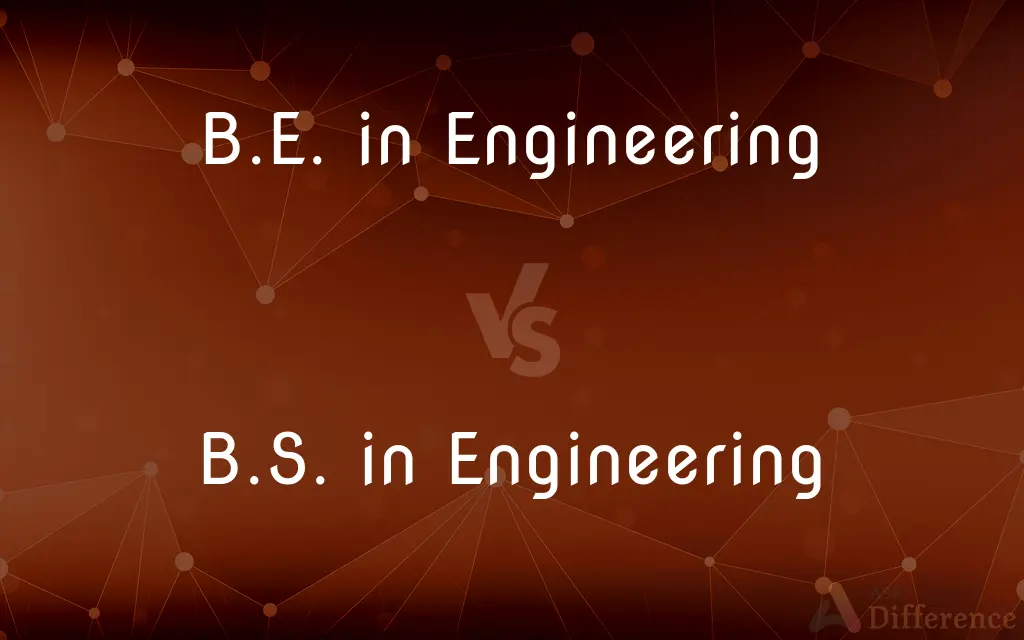B.E. in Engineering vs. B.S. in Engineering — What's the Difference?
By Tayyaba Rehman & Urooj Arif — Published on February 5, 2024
B.E. (Bachelor of Engineering) focuses on practical technical skills, while B.S. (Bachelor of Science) in Engineering emphasizes theoretical knowledge and scientific approach.

Difference Between B.E. in Engineering and B.S. in Engineering
Table of Contents
ADVERTISEMENT
Key Differences
B.E. in Engineering often has a more practical, hands-on approach, emphasizing real-world application of engineering principles. B.S. in Engineering leans towards a theoretical and scientific study, offering a broader understanding of engineering concepts.
B.E. programs may include more practical projects and industry placements, directly linking theory with practice. B.S. in Engineering often involves more coursework in mathematics and fundamental sciences as part of the curriculum.
Graduates with a B.E. tend to enter roles that require applied engineering skills in specific fields. Those with a B.S. in Engineering may find opportunities in research, development, or further academic pursuits.
Both B.E. and B.S. in Engineering are recognized degrees, but accreditation bodies and regional preferences might favor one over the other for certain professional certifications.
The distinction between B.E. and B.S. in Engineering varies globally, with some countries considering them equivalent, while others maintain distinct differences in focus and content.
ADVERTISEMENT
Comparison Chart
Curriculum Focus
Practical, hands-on skills and application
Theoretical knowledge, scientific approach
Course Structure
More practical projects, industry placements
More coursework in math and science
Career Pathways
Applied engineering roles, specific fields
Research, development, academia
Accreditation
Varies by region, often industry-focused
Generally recognized, varies by institution
International View
Viewed differently across countries
Consistent global recognition
Compare with Definitions
B.E. in Engineering
B.E. in Engineering is tailored towards preparing students for the engineering profession.
He pursued a B.E. in Chemical Engineering to work in the pharmaceutical industry.
B.S. in Engineering
B.S. in Engineering prepares students for diverse opportunities, including further academic pursuits.
After my B.S. in Aerospace Engineering, I decided to pursue a master's degree.
B.E. in Engineering
B.E. provides a blend of theoretical knowledge and practical engineering skills.
My B.E. in Electrical Engineering involved both classroom learning and lab work.
B.S. in Engineering
B.S. programs often require extensive study in mathematics and foundational sciences.
Completing my B.S. in Engineering involved challenging courses in advanced mathematics.
B.E. in Engineering
B.E. programs often include industry internships as part of the curriculum.
During my B.E., I interned at an electronics firm, gaining hands-on experience.
B.S. in Engineering
B.S. in Engineering is an undergraduate degree that emphasizes theoretical aspects of engineering.
Her B.S. in Engineering led to a career in engineering research and development.
B.E. in Engineering
B.E. is an undergraduate degree with an emphasis on direct application of engineering principles.
Her B.E. in Civil Engineering equipped her with the skills to immediately contribute to construction projects.
B.S. in Engineering
B.S. in Engineering offers a broad understanding of engineering with a scientific perspective.
His B.S. in Biomedical Engineering included extensive coursework in biology and chemistry.
B.E. in Engineering
B.E. stands for Bachelor of Engineering, a degree focusing on practical engineering skills.
After completing my B.E. in Mechanical Engineering, I started working in automotive design.
B.S. in Engineering
B.S. in Engineering stands for Bachelor of Science in Engineering, focusing on a scientific approach to engineering.
My B.S. in Engineering has given me a strong foundation in both physics and engineering principles.
Common Curiosities
What is a B.S. in Engineering?
B.S. in Engineering is a Bachelor of Science degree emphasizing the scientific and theoretical aspects of engineering.
What is a B.E. in Engineering?
B.E. stands for Bachelor of Engineering, an undergraduate degree focusing on practical engineering skills.
Are there different specializations available in B.E. in Engineering?
Yes, B.E. programs offer various specializations, such as mechanical engineering, electrical engineering, civil engineering, and more.
What is the duration of a B.E. in Engineering program?
Typically, a B.E. program takes four years to complete.
Are B.E. and B.S. in Engineering recognized equally in the job market?
Both degrees are generally respected, but preference may vary by industry and job role.
What career opportunities are available with a B.E. in Engineering?
Graduates with a B.E. in Engineering can pursue careers in engineering, project management, research, and development, among others.
What is the difference between a B.E. and a B.S. in Engineering?
B.E. typically emphasizes more practical and applied aspects of engineering, while B.S. (Bachelor of Science) in Engineering may include a broader science and mathematics foundation.
How do B.E. and B.S. in Engineering differ in curriculum?
B.E. focuses more on practical applications, while B.S. includes more theoretical and scientific coursework.
What are the admission requirements for B.E. in Engineering?
Admission requirements may vary by institution, but they generally include high school transcripts, standardized test scores, and sometimes an entrance exam.
Can you pursue higher education after completing a B.E. in Engineering?
Yes, many students choose to pursue master's or doctoral degrees in engineering or related fields after completing their B.E. program.
Can you pursue a B.E. in Engineering after completing high school?
Yes, B.E. programs are typically undergraduate degrees that can be pursued after completing high school or equivalent education.
What are the admission requirements for B.S. in Engineering?
Admission requirements may vary by institution, but they generally include high school transcripts, standardized test scores, and sometimes an entrance exam.
Is a B.E. in Engineering recognized internationally?
Yes, a B.E. in Engineering is generally recognized worldwide, although specific recognition may depend on the accreditation of the institution.
What career opportunities are available with a B.S. in Engineering?
Graduates with a B.S. in Engineering can pursue careers in engineering, technology, research, development, and various industries.
Share Your Discovery

Previous Comparison
Axle-Back vs. Cat-Back
Next Comparison
Tomatoes vs. Cherry TomatoesAuthor Spotlight
Written by
Tayyaba RehmanTayyaba Rehman is a distinguished writer, currently serving as a primary contributor to askdifference.com. As a researcher in semantics and etymology, Tayyaba's passion for the complexity of languages and their distinctions has found a perfect home on the platform. Tayyaba delves into the intricacies of language, distinguishing between commonly confused words and phrases, thereby providing clarity for readers worldwide.
Co-written by
Urooj ArifUrooj is a skilled content writer at Ask Difference, known for her exceptional ability to simplify complex topics into engaging and informative content. With a passion for research and a flair for clear, concise writing, she consistently delivers articles that resonate with our diverse audience.
















































